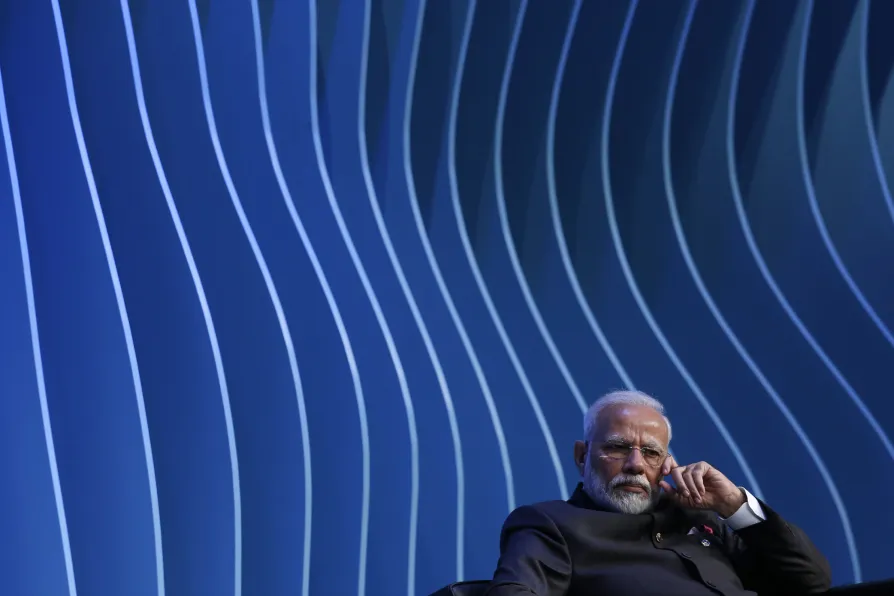
 India's Prime Minister Narendra Modi
India's Prime Minister Narendra Modi
KEIR STARMER’S decision to “change policy on the hoof,” as the Indian Workers’ Association (IWA) charges, with a retreat from Labour conference policy on Kashmir has sparked a backlash from much of the left of the party.
Momentum fears that Starmer’s emphatically neutral stance on the Kashmir conflict, adopted following a meeting with Labour Friends of India, is a betrayal of the party’s commitment to an “ethical foreign policy.”
Starmer is undoubtedly right that it is not the place of a former colonial power to adjudicate on the dispute between India and Pakistan over sovereignty of Kashmir. That can only be resolved bilaterally.
Yet the implication of his commitment to “rebuild trust with the Indian community” — that this is best done by muting any criticism of the Indian government — is deeply worrying.
As the IWA points out, the Narendra Modi regime has imposed a harsh military lockdown on Kashmir, with “elected representatives including former chief ministers imprisoned and placed under house arrest. Schools and colleges remain closed and social media [is] restricted.”
The process by which Jammu & Kashmir was deprived of its statehood was an unconstitutional farce, with the state assembly unceremoniously dissolved and a New Delhi-appointed governor imposed to carry out the ruling BJP party’s long-standing aim of removing the state’s special status, which was designed to protect it, as the only Muslim-majority state in India, from forced demographic change.
Nor can it be understood except as part of Modi’s wider political project: to replace India’s secular republic with a “theocratic, fascistic Hindu nation,” in the words of Communist Party of India (Marxist) general secretary Sitaram Yechury.
It is the same project behind the Citizenship Amendment Bill that has brought millions out onto the streets in protest since it writes anti-Muslim discrimination into law for the first time; behind the National Register of Citizens that has deprived millions of people of citizenship in Assam; and behind repeated attacks on the rights of Indian states by the central government.
The term fascist is over-used on the left, often being directed at nationalists or racists generally. Yet among all the nationalist right-wing strongmen who have come to prominence in the current period — Donald Trump, Jair Bolsonaro, Recep Tayyip Erdogan, Viktor Orban and others — it is Modi whose political practice most closely resembles traditional fascism.
The bid to forge a monolithic “Hindutva” identity that paints non-Hindu members of India’s hugely diverse ethnic and religious make-up as somehow alien, the persecution of opposition politicians, and, above all, the routine use of savage political violence — in which thousands of people have been killed since 2014 — are all chillingly reminiscent of fascism.
The BJP’s street-fighter wing, the RSS, predates the political party itself and actively targets the left, Muslims, Christians and other minorities, seeking to break up meetings and assault activists.
Resistance to this agenda is rife in India, and often communist-led, as in the state of Kerala. Many British residents of Indian descent are also passionately opposed to Modi’s regime.
Yet Modi does present himself as the guardian of the entire Indian civilisation and actively seeks to interfere in foreign politics, trying to mobilise the Indian diaspora behind his allies in foreign states. This made him the first Indian prime minister to campaign in a US presidential election — for Trump, of course — and saw the BJP campaign for a Conservative government in Britain last December.
It would be a shame if Labour’s response to this attempt to interfere in our own election was to conclude that it has “lost trust” by criticising Modi and agree to hold its tongue in future.
The internationalist duty is to stand in solidarity with the oppressed peoples of the subcontinent, not a political leader who is spearheading the most dangerous offensive against secular democratic politics that India has seen in the seven decades since it threw off the colonial yoke.













